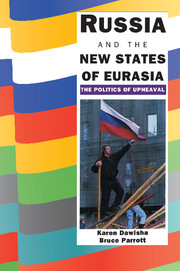Book contents
- Frontmatter
- Contents
- Preface
- Maps
- Introduction
- 1 The Legacies of History
- 2 National Identity and Ethnicity
- 3 The Impact of Religion
- 4 Political Culture and Civil Society
- 5 The Impact of Economics
- 6 Foreign Policy Priorities and Institutions
- 7 Military Issues
- 8 The Nuclear Factor
- Conclusion
- Appendix A Chronology of Events, January 1992 to October 1993
- Appendix B Compendium of Leadership and Institutional Changes in the Eurasian States, January 1992 to October 1993
- Appendix C Soviet Census Data, Union Republic and ASSR, 1989
- Notes
- Index
5 - The Impact of Economics
Published online by Cambridge University Press: 06 July 2010
- Frontmatter
- Contents
- Preface
- Maps
- Introduction
- 1 The Legacies of History
- 2 National Identity and Ethnicity
- 3 The Impact of Religion
- 4 Political Culture and Civil Society
- 5 The Impact of Economics
- 6 Foreign Policy Priorities and Institutions
- 7 Military Issues
- 8 The Nuclear Factor
- Conclusion
- Appendix A Chronology of Events, January 1992 to October 1993
- Appendix B Compendium of Leadership and Institutional Changes in the Eurasian States, January 1992 to October 1993
- Appendix C Soviet Census Data, Union Republic and ASSR, 1989
- Notes
- Index
Summary
Just as many social theorists believe that liberal democracies are less likely than authoritarian regimes to initiate wars against other states, many observers believe that a developed market economy and a high degree of international economic integration make countries less prone to resort to military force, domestically and externally. In the countries of the former Soviet Union, this proposition may receive a serious test.
The post-Soviet states inherited relatively high levels of economic interdependence that made them far more reliant on each other for trade than on the outside world. However, the Soviet era has also bequeathed a legacy of animosity that has caused some of the new states to pursue the objective of complete independence, especially from Russia, the country they perceive as most responsible for the political and economic damage done during the Soviet period. For their part, most Russians view their neighbors as economic burdens for which Russia has sacrificed its own economic health for decades.
Operating alongside this mutual animosity, however, is the equal, or greater, desire by the populations of these new countries for economic security, which outranks military security as a source of public concern. The task facing all these countries, therefore, is to develop their economies by transforming economic dependency and national enmities into normal international economic relations with the other new states and the outside world. In this way, economic interaction may potentially serve as a vehicle both for economic recovery within the new states and for ethnic and national peace among all the states of Eurasia. However, given the economic crises in the new states, the hostility of some leaders to economic reform, and the growth of interethnic and international conflict these objectives may be unrealizable for the foreseeable future.
- Type
- Chapter
- Information
- Russia and the New States of EurasiaThe Politics of Upheaval, pp. 161 - 194Publisher: Cambridge University PressPrint publication year: 1994



